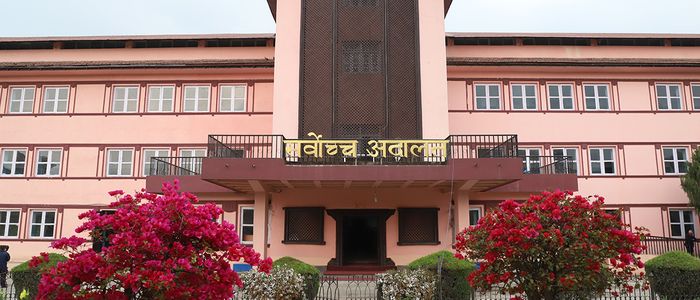
The Supreme Court has issued an order to appoint the president of Nepali Congress, Sher Bahadur Deuba, as the Prime Minister of Nepal within 24 hours in accordance with Article 76 (5) of the Constitution of Nepal.
The five-member constitutional bench of Deepak Kumar Karki, Meera Khadka, Ishwar Prasad Khatiwada and Ananda Mohan Bhattarai, led by Chief Justice Cholendra Shumsher Rana issued the ruling to this effect on Monday afternoon.
The decision taken by President Bidya Devi Bhandari to dissolve the House of Representatives (HoR) on the recommendation of the Council of Ministers has also been overturned by the Supreme Court.
With this order of, the House of Representatives has been reinstated.
The apex court has ordered to host the next session of the reinstated within seven days.
The constitutional bench, in their ruling, stated that President Bhandari’s decision to dissolve HoR on recommendation of Prime Minister KP Sharma Oli was an unconstitutional act.
Similarly, the court has also ordered that party whip cannot be used against lawmakers who voted for Deuba.
The Supreme Court has ruled that the parties concerned should not take disciplinary action against their lawmakers for assisting in the formation of the government as per Article 76 (5) of the Constitution of Nepal.
Deuba had received support from some UML and JSP-N lawmakers in his claim for prime ministerial position.
Along with Deuba, 146 lawmakers had filed a writ petition in the Supreme Court demanding the reinstatement of the HoR and Deuba’s appointment as the new prime minister.
According to Article 76 (3) of the Constitution, UML parliamentary party leader KP Oli, who was appointed as the Prime Minister as the leader of the largest party in the House of Representatives, should have sought vote of confidence within 30 days of his appointment.
However, Oli did not do so saying that the political situation wouldn’t change even if he sought vote of confidence. He then recommended the President to move ahead with the process of forming the government as per Article 76(5) of the Constitution.
A day ahead of the verdict, members of the CPN-UML Task Force had finalized a 10-point deal to end intra-party disputes late on Sunday.
Disputes had surfaced within CPN-UML after Prime Minister KP Sharma Oli unilaterally dissolved the House of Representatives on May 23 despite the formation of a 10-member taskforce on May 16 on the basis of consensus between Oli and party senior leader Madhav Kumar Nepal.
Party leaders have agreed to revive all party committees and structures that existed before UML’s merger with CPN-Maoist Center, party Spokesperson Pradeep Kumar Gyawali informed as he read out the contents of the agreement to mediapersons.
In case of House dissolution issue and on the issue of the government, the taskforce decided to reach a lawful institutional conclusion based on the spirit of party unity.
As many as 146 members of the dissolved House of Representatives, including 23 UML lawmakers, had signed the petition that challenged the House dissolution.
A Standing Committee meeting scheduled for 5:00 pm today is said to endorse the proposal.
After the agreement, the prime minister’s press adviser, Surya Thapa, in a now deleted post, made sarcastic remarks stating that there were now only 123 Members of Parliament supporting Sher Bahadur Deuba to become the Prime Minister.
UML senior leader Nepal expressed objection to Thapa’s statement saying, “Interpreting the agreement in a way to influence the Supreme Court’s decision or in contempt of court is unacceptable.”
“I would like to make it clear that the 23 lawmakers of CPN-UML, who are petitioners in the House dissolution case under consideration in the Supreme Court, are all together and firm in their signature submission,” Nepal wrote on his Facebook page.






